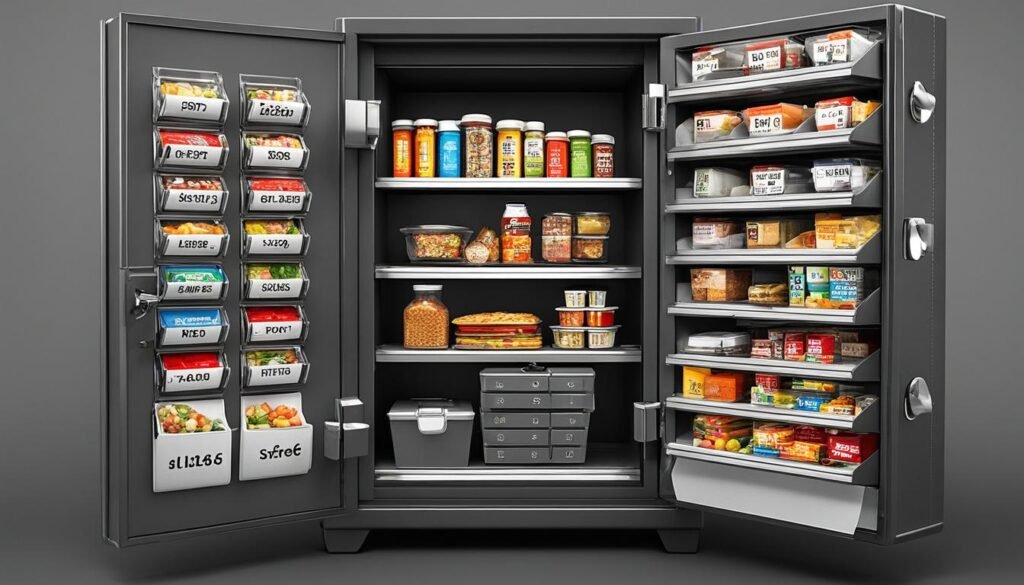Are you tired of the cycle of yo-yo dieting, where you lose weight, only to regain it again? Achieving permanent weight loss can be challenging after going through this frustrating cycle. But don’t lose hope! By adopting sustainable habits and making lasting lifestyle changes, you can break free from the yo-yo dieting cycle and achieve permanent weight loss.
In this article, I will share with you the six most effective weight loss habits that can help you achieve permanent weight loss. These habits are based on scientific research and will set you on the path towards a healthier and happier you. Say goodbye to the yo-yo dieting dilemma and hello to sustainable weight loss (check this post out)!
Key Takeaways:
- Adopt sustainable habits and make lasting lifestyle changes for permanent weight loss.
- Understand the detrimental effects of yo-yo dieting on achieving long-term weight loss.
- Reduce daily calorie intake by 200 calories for a sustainable approach to weight loss.
- Burn at least 300 calories through daily exercise for steady weight loss.
- Stay hydrated when you feel hungry to curb unnecessary calorie consumption.
- Prioritize quality sleep to support your weight loss efforts.
- Opt for whole foods over processed ones for nutrient-rich weight loss.
The Yo-Yo Dieting Dilemma
Yo-yo dieting is a common phenomenon where individuals undergo repeated cycles of weight loss followed by weight gain. This frustrating cycle often occurs as a result of restrictive eating and extreme exercise regimens, which can be detrimental to long-term weight loss success. Understanding the detrimental effects of yo-yo dieting is essential in adopting sustainable strategies for achieving permanent weight loss.
When individuals engage in restrictive diets, they often severely limit their calorie intake and eliminate entire food groups, leading to rapid weight loss. However, the body perceives these drastic changes as a threat and triggers a response that slows down metabolism and preserves fat stores. As a result, when the restrictive diet ends and regular eating patterns resume, the body is primed to regain the lost weight, leading to weight gain.
Yo-yo dieting not only disrupts the delicate balance of the body’s metabolism but can also have negative psychological effects. The constant cycle of losing and gaining weight can erode self-confidence and create feelings of failure and frustration. This can make it even more difficult to maintain long-term weight loss and establish healthy lifestyle habits.
“Yo-yo dieting often leads to a vicious cycle of weight loss and regain. It can be incredibly frustrating and demotivating for individuals who are striving for permanent weight loss. Breaking free from this cycle requires a shift in mindset and the adoption of sustainable habits.”
To overcome the yo-yo dieting dilemma, it is important to focus on sustainable approaches to weight loss. This includes adopting a balanced and nutritious eating plan, incorporating regular physical activity, and making lasting lifestyle changes. By avoiding restrictive diets and instead embracing a healthy and flexible approach, individuals can achieve permanent weight loss and break free from the frustrating cycle of yo-yo dieting.
Next, we will explore the reasons behind yo-yo dieting and strategies to overcome this challenge. But first, let’s take a closer look at the detrimental effects of restrictive diets and weight gain.
Understanding Yo-Yo Dieting

Yo-yo dieting is a common phenomenon that many individuals experience when attempting to lose weight. It occurs because our bodies have evolved a mechanism to protect against potential periods of scarcity and famine. This mechanism involves the storage of excess energy as fat, which can make weight loss challenging and contribute to the yo-yo dieting effect.
When we engage in extreme calorie restriction, our bodies interpret it as a signal of potential scarcity. In response, our body’s fat storage mechanism is activated, as it tries to preserve energy reserves for future needs. This survival mechanism can be a significant hurdle in achieving permanent weight loss.
Understanding the body’s fat storage mechanism is crucial in overcoming yo-yo dieting and achieving long-term weight loss success. It allows us to develop effective strategies that work with our bodies, rather than against them.
“To understand and conquer yo-yo dieting, we must work with our bodies’ natural mechanisms, rather than against them.”
By adopting sustainable habits and making lasting lifestyle changes, we can achieve permanent weight loss and break free from the cycle of yo-yo dieting. The key lies in finding a balanced approach that promotes a healthy lifestyle while still allowing for the enjoyment of food and achieving an optimal weight.
| Factors Contributing to Yo-Yo Dieting | Impact on Weight Loss |
|---|---|
| Extreme calorie restriction | Triggers the body’s fat storage mechanism, making weight loss challenging |
| Unsustainable dieting practices | Can lead to binge eating and weight regain |
| Lack of focus on long-term habits | Results in a temporary approach to weight loss without addressing underlying lifestyle factors |
| Emotional eating and food cravings | Can derail weight loss efforts and lead to yo-yo dieting cycles |
Habit 1: Shave Off 200 Calories from Your Diet
When it comes to achieving permanent weight loss, adopting a sustainable approach is key. Instead of resorting to extreme fasting or crash diets, a simple yet effective strategy is to reduce your daily calorie intake by a modest 200 calories. This approach allows for gradual and lasting weight loss without triggering your body’s fat storage mechanism.
By consistently consuming 200 fewer calories each day, you can create a sustainable calorie deficit that promotes weight loss over time. This reduction is manageable and doable in the long run, making it easier to stick to healthy habits and maintain your progress.
Here are some practical ways to shave off those 200 calories:
- Opt for low-calorie alternatives: Replace high-calorie foods with lower-calorie options. For example, choose a piece of fruit instead of a sugary snack or opt for grilled chicken instead of fried.
- Be mindful of portion sizes: Pay attention to portion sizes and avoid oversized servings. Use smaller plates and bowls to control your portion sizes visually.
- Limit sugary beverages: Cut back on sugary drinks like soda and juice, which are high in calories. Choose water, unsweetened tea, or sparkling water instead.
- Avoid mindless snacking: Snacking can easily add up the calories. Be mindful of your snacking habits and opt for healthier options like vegetables, nuts, or yogurt.
Remember, small changes add up over time. By incorporating these calorie reduction strategies into your daily routine, you can achieve permanent weight loss without feeling deprived or overwhelmed.
Habit 2: Burn 300 Calories Through Daily Exercise

Exercise is a vital component of weight management and overall health. To achieve your weight loss goals and maintain them, consistent physical activity is essential. Cross-training, which involves alternating between different types of exercises, is a great way to avoid plateauing and prevent injuries. By engaging in a variety of activities, you can keep your workouts interesting and target different muscle groups.
The goal is to burn at least 300 calories through exercise daily. This calorie burn will contribute to steady weight loss and help you achieve your desired results. Whether it’s running, cycling, swimming, or participating in group fitness classes, finding exercises that you enjoy and that challenge you is key. The more you enjoy your workouts, the more consistent you’ll be in incorporating them into your routine.
Consistency is crucial in achieving permanent weight loss through exercise. Aim for at least 150 minutes of moderate-intensity aerobic activity or 75 minutes of vigorous-intensity aerobic activity each week, in addition to strength training exercises twice a week. Regular physical activity not only helps with weight loss but also improves cardiovascular health, boosts mood, and enhances overall well-being.
Remember to listen to your body and rest when needed. Pushing yourself too hard without proper rest and recovery can lead to burnout or injuries. Incorporate rest days into your schedule and prioritize sleep to allow your body to recover and repair.
Habit 3: Hydrate When You Feel Hungry

Sometimes, the body’s signals for hunger can be confused with dehydration. When you feel hungry, try drinking a glass of water instead of reaching for a snack. Staying adequately hydrated can curb unnecessary calorie consumption and support weight loss by aiding metabolism. Prioritizing hydration is an easy and effective way to achieve permanent weight loss.
| Benefits of Hydration for Weight Loss | How to Hydrate |
|---|---|
| 1. Curbs unnecessary calorie consumption | 1. Carry a water bottle with you throughout the day |
| 2. Aids metabolism and digestion | 2. Set reminders to drink water at regular intervals |
| 3. Promotes overall well-being | 3. Opt for water instead of sugary beverages |
| 4. Flavor water with slices of lemon, cucumber, or mint for added taste |
Remember, staying hydrated not only supports weight loss but also contributes to your overall health and well-being. Make it a habit to drink water whenever you feel hungry, and you’ll soon notice the positive impact it has on your weight loss journey.
Habit 4: Prioritize Quality Sleep

Quality sleep plays a pivotal role in achieving weight loss goals and maintaining overall health. The impact of sleep on metabolism and appetite regulation cannot be overstated. Lack of sleep not only hinders weight loss efforts but also increases the risk of obesity, insulin resistance, and other health issues.
To improve your sleep quality and support your weight loss journey, it is important to develop healthy sleep habits. Here are some effective strategies:
- Avoid caffeine intake in the afternoon and evening, as it can interfere with your ability to fall asleep and stay asleep.
- Limit screen time before bedtime. The blue light emitted by electronic devices can disrupt your sleep pattern by suppressing the production of melatonin, a hormone that regulates sleep.
- Create a conducive sleep environment. Make sure your bedroom is quiet, dark, and at a comfortable temperature. Investing in a quality mattress and pillow can also contribute to a restful sleep.
- Establish a consistent sleep schedule. Go to bed and wake up at the same time every day, even on weekends. This helps regulate your body’s internal clock and improves the quality of your sleep.
- Practice relaxation techniques before bedtime, such as deep breathing exercises, meditation, or taking a warm bath. These activities can help calm your mind and prepare your body for a restful sleep.
Prioritizing quality sleep is a fundamental component of achieving permanent weight loss. By adopting these sleep habits, you can optimize your body’s natural processes, support your weight loss efforts, and improve your overall well-being.
Habit 5: Opt for Whole Foods Over Processed Ones

Transitioning to a diet rich in whole foods and low in processed ones is a highly effective strategy for weight loss and achieving long-term weight management. Whole foods, such as vegetables, lean proteins, and healthy fats, not only provide essential nutrients but also support efficient metabolism and promote overall better health.
By prioritizing whole foods in your diet, you can experience initial weight loss and sustain it in the long run. Unlike processed foods that are often high in added sugars, unhealthy fats, and empty calories, whole foods offer a range of benefits that contribute to permanent weight loss. Whole foods tend to be more filling, reducing the likelihood of overeating, and they provide a steady stream of energy throughout the day.
Whole foods for weight loss:
- Vegetables: Incorporate a variety of colorful vegetables into your meals and snacks. These nutrient-dense foods are low in calories and high in fiber, which helps you feel satisfied and supports healthy digestion.
- Lean proteins: Choose lean sources of protein, such as chicken, fish, tofu, or legumes, to fuel your body and build lean muscle mass. Protein can help increase satiety, boost metabolism, and preserve muscle mass during weight loss.
- Healthy fats: Include sources of healthy fats, such as avocados, nuts, seeds, and olive oil. These fats provide essential nutrients, help regulate hunger hormones, and support brain function.
By opting for nutrient-rich whole foods over processed ones, you can make significant progress towards achieving permanent weight loss. Take the time to plan and prepare meals, incorporating a variety of whole food options, and savor the flavors and textures they offer. Remember, the key to successful weight loss lies in nourishing your body with wholesome, nutrient-dense foods.
Habit 6: Break Free from Yo-Yo Dieting Patterns
Breaking free from yo-yo dieting requires a shift in perspective from temporary diets to lasting lifestyle changes. Instead of following restrictive diets for a short period, I embrace an anti-inflammatory lifestyle that focuses on long-term well-being. This lifestyle includes primarily consuming vegetables, some meat and fruit, choosing healthier fats, and occasionally incorporating a cheat meal after reaching my target weight. By adopting an anti-inflammatory lifestyle, I can achieve permanent weight loss and break free from the cycle of yo-yo dieting.
| Lifestyle Changes for Permanent Weight Loss |
|---|
| Primarily consume vegetables |
| Incorporate some meat and fruit |
| Choose healthier fats |
| Occasionally have a cheat meal after reaching target weight |
The Age Factor and Yo-Yo Dieting

As individuals age, their bodies’ ability to burn calories efficiently changes. Metabolism tends to slow down after the age of 50, making it more challenging to bounce back from aggressive weight loss efforts. Understanding the impact of age on weight loss can help individuals tailor their strategies and set realistic expectations. Adapting to these metabolic changes is crucial in achieving permanent weight loss.
Metabolic Changes and Weight Loss
Age-related metabolic changes can affect weight loss outcomes. As we get older, our bodies undergo various physiological changes, including a decrease in muscle mass and a decline in hormone production. These changes can result in slower metabolic rates and reduced calorie-burning capacity.
With a slower metabolism, the body requires fewer calories to function, which can make weight loss more challenging. Aggressive weight loss efforts that may have worked in our younger years may no longer yield the same results. It’s important to recognize and accept these changes to avoid frustration and disappointment.
Setting Realistic Expectations
When embarking on a weight loss journey, it’s crucial to set realistic expectations, especially considering the age-related metabolic changes. While rapid weight loss may seem appealing, it’s not sustainable, particularly for older individuals. Instead, focusing on gradual weight loss and making long-term lifestyle changes is key.
“I’ve learned that patience is vital when it comes to weight loss, especially as I’ve gotten older. I had to shift my mindset from wanting immediate results to recognizing that sustainable weight loss takes time and consistency.”
Adapting Strategies for Age
Adapting weight loss strategies to accommodate age-related metabolic changes can enhance success. Here are a few tips:
- Focus on strength training: Incorporate resistance exercises into your fitness routine to preserve muscle mass and boost metabolism.
- Eat nutrient-dense foods: Prioritize whole, nutrient-rich foods to support overall health and satisfy nutritional needs while consuming fewer calories.
- Stay active: Engage in regular physical activity to maintain muscle mass and counteract the age-related decline in metabolism.
- Practice portion control: Be mindful of portion sizes to avoid overeating and compensate for the slower metabolic rate.
By understanding how age affects weight loss and making necessary adjustments, individuals can achieve permanent weight loss and maintain a healthy lifestyle.
Conclusion: Sustainable Weight Loss is Achievable
Achieving permanent weight loss after yo-yo dieting is a goal that can be realized with the right approach and mindset. By adopting sustainable habits and making lasting lifestyle changes, individuals can overcome the cycle of yo-yo dieting and achieve long-term success.
Understanding the detrimental effects of yo-yo dieting is crucial in breaking free from this pattern. It is important to implement effective weight loss strategies that focus on sustainable practices rather than quick fixes. By prioritizing overall well-being and adopting a holistic approach, individuals can achieve permanent weight loss.
Remember, achieving permanent weight loss is not about following temporary diets. It is about embracing a healthy lifestyle that includes balanced nutrition, regular physical activity, quality sleep, and stress management. By incorporating these habits into your daily routine, you can overcome yo-yo dieting and achieve sustainable weight loss for a healthier and happier future (check out my post on sustainable weight loss here).




